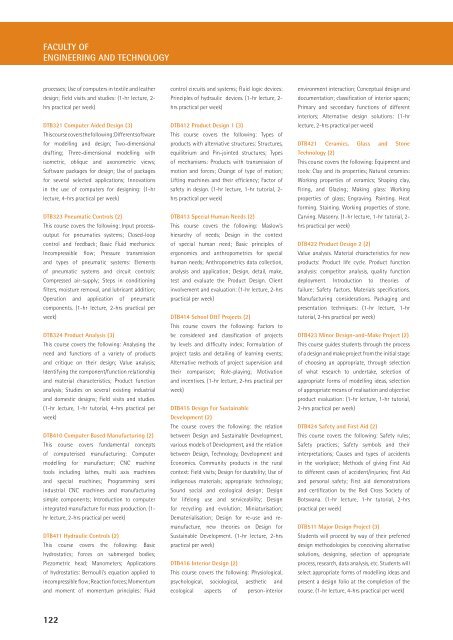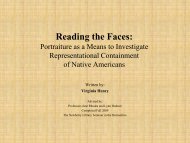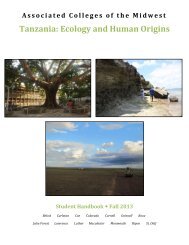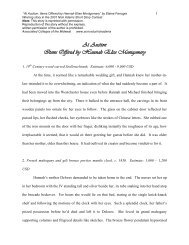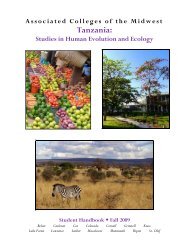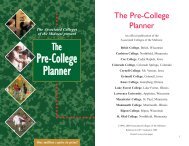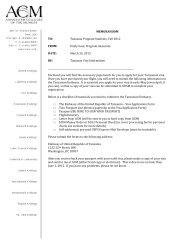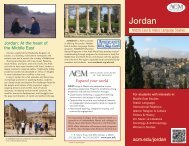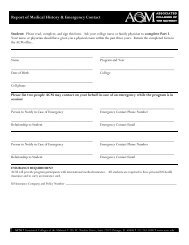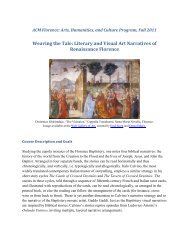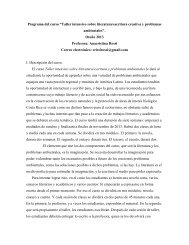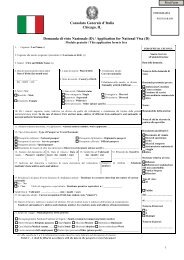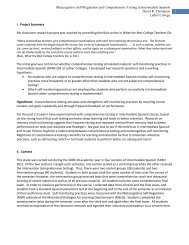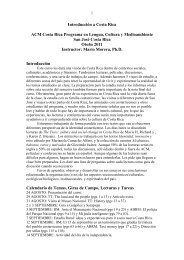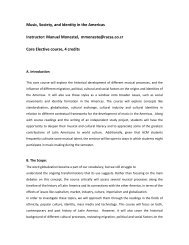academic calendar academic calendar - Associated Colleges of the ...
academic calendar academic calendar - Associated Colleges of the ...
academic calendar academic calendar - Associated Colleges of the ...
Create successful ePaper yourself
Turn your PDF publications into a flip-book with our unique Google optimized e-Paper software.
FACULTY OF<br />
engineering AND Technology<br />
processes; Use <strong>of</strong> computers in textile and lea<strong>the</strong>r<br />
design; Field visits and studies: (1-hr lecture, 2-<br />
hrs practical per week)<br />
DTB321 Computer Aided Design (3)<br />
This course covers <strong>the</strong> following: Different s<strong>of</strong>tware<br />
for modelling and design; Two-dimensional<br />
drafting; Three-dimensional modelling with<br />
isometric, oblique and axonometric views;<br />
S<strong>of</strong>tware packages for design; Use <strong>of</strong> packages<br />
for several selected applications; Innovations<br />
in <strong>the</strong> use <strong>of</strong> computers for designing: (1-hr<br />
lecture, 4-hrs practical per week)<br />
DTB323 Pneumatic Controls (2)<br />
This course covers <strong>the</strong> following: Input processoutput<br />
for pneumatics systems; Closed-loop<br />
control and feedback; Basic Fluid mechanics:<br />
Incompressible flow; Pressure transmission<br />
and types <strong>of</strong> pneumatic systems: Elements<br />
<strong>of</strong> pneumatic systems and circuit controls:<br />
Compressed air-supply; Steps in conditioning<br />
filters, moisture removal, and lubricant addition;<br />
Operation and application <strong>of</strong> pneumatic<br />
components. (1-hr lecture, 2-hrs practical per<br />
week)<br />
DTB324 Product Analysis (3)<br />
This course covers <strong>the</strong> following: Analysing <strong>the</strong><br />
need and functions <strong>of</strong> a variety <strong>of</strong> products<br />
and critique on <strong>the</strong>ir design; Value analysis;<br />
Identifying <strong>the</strong> component/function relationship<br />
and material characteristics; Product function<br />
analysis; Studies on several existing industrial<br />
and domestic designs; Field visits and studies.<br />
(1-hr lecture, 1-hr tutorial, 4-hrs practical per<br />
week)<br />
DTB410 Computer Based Manufacturing (2)<br />
This course covers fundamental concepts<br />
<strong>of</strong> computerised manufacturing: Computer<br />
modelling for manufacture; CNC machine<br />
tools including la<strong>the</strong>s, multi axis machines<br />
and special machines; Programming semi<br />
industrial CNC machines and manufacturing<br />
simple components; Introduction to computer<br />
integrated manufacture for mass production. (1-<br />
hr lecture, 2-hrs practical per week)<br />
DTB411 Hydraulic Controls (2)<br />
This course covers <strong>the</strong> following: Basic<br />
hydrostatics; Forces on submerged bodies;<br />
Piezometric head; Manometers; Applications<br />
<strong>of</strong> hydrostatics: Bernoulli’s equation applied to<br />
incompressible flow; Reaction forces; Momentum<br />
and moment <strong>of</strong> momentum principles: Fluid<br />
control circuits and systems; Fluid logic devices:<br />
Principles <strong>of</strong> hydraulic devices. (1-hr lecture, 2-<br />
hrs practical per week)<br />
DTB412 Product Design 1 (3)<br />
This course covers <strong>the</strong> following: Types <strong>of</strong><br />
products with alternative structures: Structures,<br />
equilibrium and Pin-jointed structures; Types<br />
<strong>of</strong> mechanisms: Products with transmission <strong>of</strong><br />
motion and forces; Change <strong>of</strong> type <strong>of</strong> motion;<br />
Lifting machines and <strong>the</strong>ir efficiency; Factor <strong>of</strong><br />
safety in design. (1-hr lecture, 1-hr tutorial, 2-<br />
hrs practical per week)<br />
DTB413 Special Human Needs (2)<br />
This course covers <strong>the</strong> following: Maslow’s<br />
hierarchy <strong>of</strong> needs; Design in <strong>the</strong> context<br />
<strong>of</strong> special human need; Basic principles <strong>of</strong><br />
ergonomics and anthropometrics for special<br />
human needs; Anthropometrics data collection,<br />
analysis and application; Design, detail, make,<br />
test and evaluate <strong>the</strong> Product Design. Client<br />
involvement and evaluation: (1-hr lecture, 2-hrs<br />
practical per week)<br />
DTB414 School D&T Projects (2)<br />
This course covers <strong>the</strong> following: Factors to<br />
be considered and classification <strong>of</strong> projects<br />
by levels and difficulty index; Formulation <strong>of</strong><br />
project tasks and detailing <strong>of</strong> learning events;<br />
Alternative methods <strong>of</strong> project supervision and<br />
<strong>the</strong>ir comparison; Role-playing; Motivation<br />
and incentives. (1-hr lecture, 2-hrs practical per<br />
week)<br />
DTB415 Design For Sustainable<br />
Development (2)<br />
The course covers <strong>the</strong> following: <strong>the</strong> relation<br />
between Design and Sustainable Development,<br />
various models <strong>of</strong> Development, and <strong>the</strong> relation<br />
between Design, Technology, Development and<br />
Economics. Community products in <strong>the</strong> rural<br />
context: Field visits; Design for durability; Use <strong>of</strong><br />
indigenous materials; appropriate technology;<br />
Sound social and ecological design; Design<br />
for lifelong use and serviceability; Design<br />
for recycling and evolution; Miniaturisation;<br />
Dematerialisation; Design for re-use and remanufacture,<br />
new <strong>the</strong>ories on Design for<br />
Sustainable Development. (1-hr lecture, 2-hrs<br />
practical per week)<br />
DTB416 Interior Design (2)<br />
This course covers <strong>the</strong> following: Physiological,<br />
psychological, sociological, aes<strong>the</strong>tic and<br />
ecological aspects <strong>of</strong> person-interior<br />
environment interaction; Conceptual design and<br />
documentation; classification <strong>of</strong> interior spaces;<br />
Primary and secondary functions <strong>of</strong> different<br />
interiors; Alternative design solutions: (1-hr<br />
lecture, 2-hrs practical per week)<br />
DTB421 Ceramics, Glass and Stone<br />
Technology (2)<br />
This course covers <strong>the</strong> following: Equipment and<br />
tools: Clay and its properties; Natural ceramics:<br />
Working properties <strong>of</strong> ceramics; Shaping clay,<br />
Firing, and Glazing; Making glass: Working<br />
properties <strong>of</strong> glass; Engraving. Painting. Heat<br />
forming. Staining. Working properties <strong>of</strong> stone.<br />
Carving. Masonry. (1-hr lecture, 1-hr tutorial, 2-<br />
hrs practical per week)<br />
DTB422 Product Design 2 (2)<br />
Value analysis. Material characteristics for new<br />
products: Product life cycle. Product function<br />
analysis: competitor analysis, quality function<br />
deployment. Introduction to <strong>the</strong>ories <strong>of</strong><br />
failure: Safety factors. Materials specifications.<br />
Manufacturing considerations. Packaging and<br />
presentation techniques: (1-hr lecture, 1-hr<br />
tutorial, 2-hrs practical per week)<br />
DTB423 Minor Design-and-Make Project (2)<br />
This course guides students through <strong>the</strong> process<br />
<strong>of</strong> a design and make project from <strong>the</strong> initial stage<br />
<strong>of</strong> choosing an appropriate, through selection<br />
<strong>of</strong> what research to undertake, selection <strong>of</strong><br />
appropriate forms <strong>of</strong> modelling ideas, selection<br />
<strong>of</strong> appropriate means <strong>of</strong> realisation and objective<br />
product evaluation: (1-hr lecture, 1-hr tutorial,<br />
2-hrs practical per week)<br />
DTB424 Safety and First Aid (2)<br />
This course covers <strong>the</strong> following: Safety rules;<br />
Safety practices; Safety symbols and <strong>the</strong>ir<br />
interpretations; Causes and types <strong>of</strong> accidents<br />
in <strong>the</strong> workplace; Methods <strong>of</strong> giving First Aid<br />
to different cases <strong>of</strong> accident/injuries; First Aid<br />
and personal safety; First aid demonstrations<br />
and certification by <strong>the</strong> Red Cross Society <strong>of</strong><br />
Botswana. (1-hr lecture, 1-hr tutorial, 2-hrs<br />
practical per week)<br />
DTB511 Major Design Project (3)<br />
Students will proceed by way <strong>of</strong> <strong>the</strong>ir preferred<br />
design methodologies by conceiving alternative<br />
solutions, designing, selection <strong>of</strong> appropriate<br />
process, research, data analysis, etc. Students will<br />
select appropriate forms <strong>of</strong> modelling ideas and<br />
present a design folio at <strong>the</strong> completion <strong>of</strong> <strong>the</strong><br />
course. (1-hr lecture, 4-hrs practical per week)<br />
122


